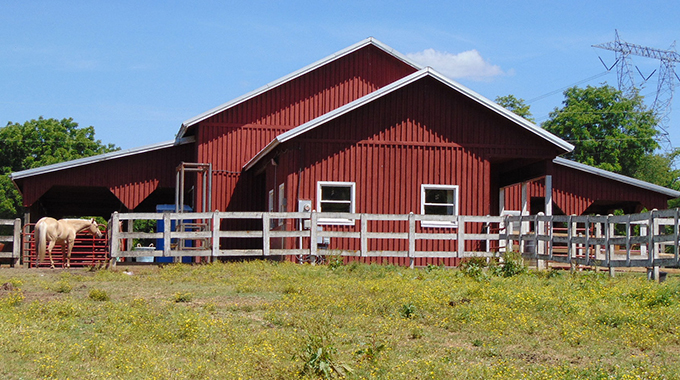Nicole Lakin
- 03 Aug, 2017
- 0 Comments
- 6 Mins Read
Starting Your Own Barn? Here’s Your Business Startup Checklist!
Featured Image Credit (CC): Virginia State Parks on Flickr
Submitted by member: Jamie
I would be interested in business planning for a startup horse operation. Because I inherited some of my father’s breeding horses, I would like to hire a trainer (colts) and small staff, etc., but I’m not sure how to start running my barn like a business.
Horses are a part of my heritage so I am trying to support and sustain a family legacy more than turn a “profit.” These are Ranch type Quarter horses that have been in my family for generations.
I know my interest in barn management is very niche, but I think other people might be interested in “breaking even” with horses while also creating local jobs with their small business.
A general interest in barn management is where to splurge and what to save on. I am all about life hacks for barn supplies and the like. Since I am remodeling a horse farm, I am very interested in DIY projects.
Thank you for your generosity with your time and interest in my suggestions. I am a very happy student/customer.
Answer by Nicole Lakin
Disclaimer: I have never had my own horse operation. So what you are about to read is the opinion of an amateur equestrian, an involved and knowledgeable horse owner, a former working student, and a business person who has the opportunity to work with and observe some of the most respected horse operations in the country. I hope that it is helpful.
1. Take stock of what you have before deciding what you need.
I spent some time teaching Entrepreneurial Thought and Action (Babson College curriculum), to secondary school students in Tanzania. We had a week to help them identify a problem in their communities, brainstorm solutions, and then think through and plan out how they would make it happen.
The goals of my students were not unlike yours. They wanted to find a way to do something that they loved to do, contribute to their communities, and solve a real problem that they were facing. They didn’t have the goal of turning a profit, although they would gladly take a profit if the opportunity presented itself.
Before talking about the startup costs and where they would find access to capital, we spent time mapping out everything that they already had. This includes the people they had access to, resources available to them, their own knowledge and expertise, their friends, their families…I could go on, but I think you get the point. Once they were really able to take stock of all that was already within their grasp, their ideas suddenly didn’t seem so far out of reach.
Once you know what you have, you can better identify what you still need. Thinking about your startup costs this way can keep you from investing in the wrong things. Cash flow is crucial when starting a business of any kind, so learning to be resourceful from the start, in how you think about and approach your business, can really give you the boost that you need to get up and running, and to stay afloat during the difficult times (note: there will be difficult times).
2. Never underestimate the value of your network.
Talk to people about what you are trying to do. Someone always knows someone who can help or offer advice. And out of all of those someones, you will likely find some great advice, a new friend, a potential partner, etc. You really never know who you could end up meeting. The horse community can often feel small. But I assure you, it is a vast, and yet also a tightly knit web of people and places with seemingly nothing in common beyond their love of horses.
3. Learn to monitor your cash flow.
Now let’s go back for a minute to the conversation of “cash flow.” Whether you are a trained accountant or have never balanced a checkbook, you can learn to manage your cash flow. Set aside some time each week to go over how much cash you have, what outstanding payments are owed, and what outstanding income you are expecting. Staying on top of cash flow will help you to avoid becoming overextended or possibly insolvent. The great thing with modern banking and technology is that basically everywhere you look, there’s an app for that.
I also recommend keeping a cash reserve once you are able. There will be ups and downs, and keeping a little cash saved during the up times will help you to get through the down times.
4. Finding, hiring, and keeping good employees is no walk in the park.
In my own entrepreneurial endeavors, and in every single barn that I have set foot in, I have found that finding, hiring, and then keeping good employees is one of the biggest challenges that you can face.
In building my own team, I have tried to surround myself with people who are good at the things that I am not, but who also demonstrate the desire to learn every day and to grow with me and my business. So far it has worked well. But now that I have found them, it is up to me to treat my employees well, to make sure that they know how much they are valued, and to help them grow and accomplish their own goals. When you find the right people, and follow these guidelines, they will go above and beyond for you and your business.
5. Communication and knowledge sharing are imperative.
One piece of advice that I cannot stress enough is to keep detailed records and request that your employees do the same. One of the major mistakes that I see a lot of horse people make, is that they have one or two people who really know the horses and the business well. They share what needs to be shared with other employees, but a lot of their knowledge, experience and know-how is just in their head.
I’ve met managers who can’t remember what they ate for breakfast, but they can recite the feed and supplements for the 30 horses in their care without pause. This is a fun party trick, but it can be really risky. What if that one person gets sick or injured, takes a vacation, or quits? This happens far more than you would imagine. So my advice is to make it easy for your team members to record and share knowledge and information. Support them in educating one another on their various responsibilities. And have regular conversations to encourage communication and to support newer team members in gaining access to this knowledge and information.
6. Never stop learning.
My final piece of advice is to remind yourself that no one knows it all. We all need to learn from each other, from the horses, from our farriers and vets. The nature of the horse business makes it pretty hard not to keep learning. So if you feel like you aren’t learning something new each day, try to expose yourself to new sources and ideas.
In addition to continuing to follow and engage with the bloggers and experts at EquestrianCoach, here are a few great resources to follow on social media.
Pro Equine Grooms:
Facebook: @proequinegrooms
Twitter: @Proequinegrooms
Instagram: @proequinegrooms
KY Equine Research
Facebook: @KentuckyEquineResearch
Twitter: @kyequine
The Horse
Facebook: @TheHorse
Twitter: @thehorse
Instagram: @thehorsemag
Here are links to the other blog posts that Nicole Lakin of BarnManager.com has written:
Have Something You Want to Ask Our Panel of Experts?
Ask The Experts is the ultimate way to get help from the top professionals in the equestrian industry without leaving the comfort of your home. This service is available to Monthly, Annual, and Lifetime Members of EquestrianCoach.com.

